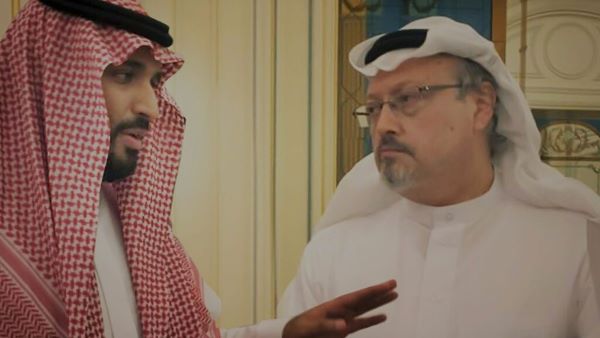
This intense documentary opens three months after the killing of Jamal Khashoggi, journalist and political commentator for The Washington Post. Initially, the film introduces one of his fellow Saudi countrymen-turned-exile, media personality Omar Abdulaziz, who, like Khashoggi, has been openly critical of the reigning crown prince of Saudi Arabia, Mohammed bin Salman. Abdulaziz, who has been forced to flee to Canada, confides early on that returning home after his comments about bin Salman—which have included taking the ruler to task over human rights violations—would mean imprisonment or possibly even death.
At first, it’s unclear exactly how he knew Khashoggi, and director Bryan Fogel (Icarus) takes his time establishing their connection. What comes next is a meticulous review of the October 2018 killing of Khashoggi, which occurred at the Saudi consulate in Istanbul. A forensic expert who worked on the case provides chilling details about what transpired as well as the aftermath, in which consulate officials barred local police from entering during the search for the missing journalist.
The film points the finger for Khashoggi’s death squarely at bin Salman, who is depicted as cracking down on free speech since ascending to the throne in 2017, through efforts such as recruiting an army of Twitter trolls to shout down anyone posting dissenting views on the platform. Fogel’s approach is, from the start, that of a globe-trotting techno-thriller, and in bin Salman, he has a James Bond–level antagonist, complete with a shadowy control room and an ambitiously named master plan (“Vision 2030”).
Sometimes Fogel goes a touch too far in this direction. For example, he makes the curious decision to dramatize an epic battle between the crown prince’s troll army, nicknamed “The Flies,” and an upstart resistance movement that goes by “The Bees.” Both forces are rendered via 3-D animation as insectoid creatures. While it’s certainly flashy, it’s also completely unnecessary and temporarily takes us out of the film.
The documentary is decidedly at its best when it’s more human-scaled in the scenes that delve into the character of Khashoggi, who had close connections to the Saudi royal family. He was a man of fascinating contradictions, gentle and soft-spoken despite having worked in a cutthroat environment for so long. There are also moments in which he comes across as almost naïve. According to one colleague, Khashoggi was absolutely floored by news that Twitter could be manipulated—he truly believed “The Flies” represented a real-life mob of Saudi citizens who were angry with him.
Fogel starts at the end of his subject’s life and then retraces the post-exile years. We get to know Khashoggi as a temporarily lost soul who gradually found peace again, but in an ironic twist, did so while becoming more defiant. As for the dark thoughts that tormented him for a time, they are revealed by those who knew him best, especially Hatice Cengiz, who became Khashoggi’s fiancée by the time of his murder. (Indeed, one of the great tragedies is how his desire to get remarried led directly to his being at the consulate building.)
Along with providing another window into the deceased’s emotional state and resilience, Cengiz proves to be a strong and compelling figure in her own right as she rallies forward in the face of a police inquiry that at one point turns her and Khashoggi’s home inside-out. Like her late fiancé, she’s a humble, introverted presence, which makes her inevitable confrontation with the forces responsible for his death at a United Nations session all the more powerful.
Fogel does an excellent job overall in ensuring that audiences feel outrage over the murder, while simultaneously maintaining Khashoggi’s dignity. Late in the film, a sequence involving an audio transcript obtained by the police in Istanbul captures the entirety of what happened inside the consulate. Various experts pore over it, pointing out the moments in which Khashoggi expressed fear for his life, the vicious way that his life was taken, and the dehumanizing way that the killers treated his body after the deed was done. Throughout this sequence, Fogel wisely refrains from reenacting any part of the transcript as seeing the words on the pages is disturbing enough.
Ultimately, The Dissident righteously calls attention to a nefarious event that sent out shockwaves felt by Saudi activists, the international journalistic community, and the lives of those who knew the journalist. Yet it also spurred all parties to continue fighting for a better world, which Fogel frames as Khashoggi’s most valuable legacy.
















Leave A Comment